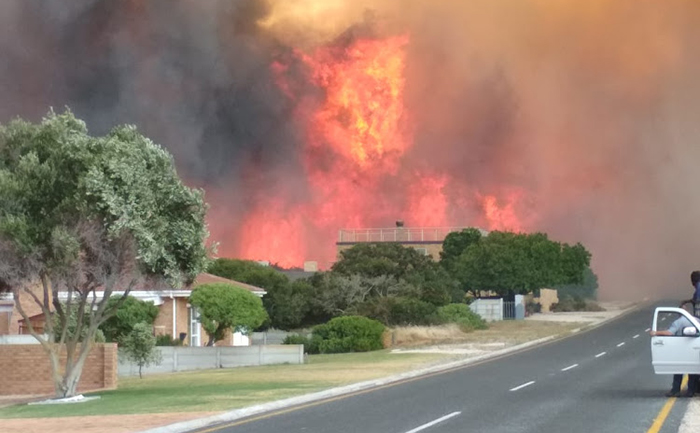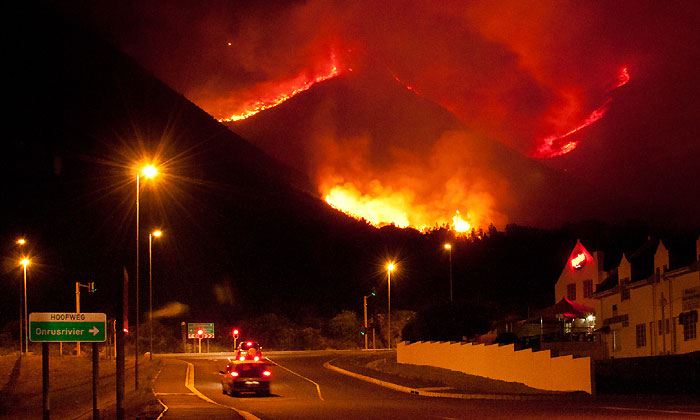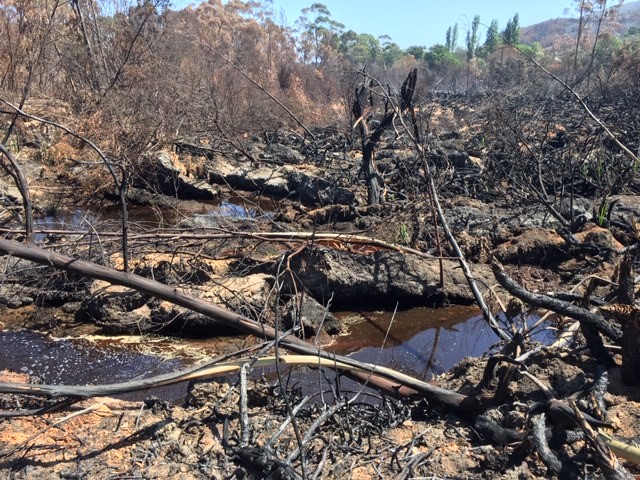– Switch everything off for one hour and help preserve our Planet. Climate change is real, and it is affecting us in one way or another.
What is climate change?
Over the last few decades, scientists noticed changes in our atmosphere.
There was a sharp increase of certain gasses trapped in the earth’s atmosphere and it was contributing to some of the worst natural disasters that were happening across the globe. The effect, which today contributes to an estimated 90% of the world’s natural disasters, became known as climate change.
South Africa isn’t safe from the effects of climate change. In 2015, South Africa recorded its lowest annual rainfall since 1904. In the same year, Cape Town also recorded its highest temperature in the last 100 years at 42°C, the lack of rain and abnormally high temperatures ended up contributing to some of the worst fires the city has seen. And in 2017/2018, the Western Cape experienced its worst drought in decades, which threatened our water security.
According to the Western Cape Department of Environmental Affairs and Development Planning, climate change will affect the Western Cape in the following ways:
• Higher average annual temperature.
• Higher maximum temperatures.
• More hot days and more heat waves.
• Higher minimum temperatures.
• Fewer cold days and frost days.
• Reduced average rainfall in the Western Cape, particularly the western parts.
• Rising sea levels
• Increased fire risks
• Increase in the frequency and intensity of extreme weather events, including floods, droughts, and storm surges.
A 2 to 4 degree Celsius rise in temperature threatens farming, dam levels, our natural environment (plant, bird and vulnerable amphibian species). Our food supply, water security and economy will be under threat.
While 4 degrees Celsius of warming doesn’t sound like much, consider the fact that the last time the earth was 5 degrees cooler was during an ice age.
As bleak as it may seem, there is hope. Climate change gives us an opportunity to innovate and create a more sustainable environment. All we have to do is play our part, and change our ways.
What causes climate change?
Climate change occurs when greenhouse gases traps too much of the sun’s heat in our atmosphere and stops it from leaking back into space. This is commonly known as the greenhouse effect, as it acts like the glass in a greenhouse. Carbon Dioxide, which is produced when we burn oils and fossil fuels, is responsible for most of our greenhouse gases.
What causes climate change?
Climate change occurs when greenhouse gases traps too much of the sun’s heat in our atmosphere and stops it from leaking back into space. This is commonly known as the greenhouse effect, as it acts like the glass in a greenhouse. Carbon Dioxide, which is produced when we burn oils and fossil fuels, is responsible for most of our greenhouse gases.
Other greenhouse gases include:
- Nitrous oxide – which can be found in fertilisers with nitrogen.
- Methane – this is produced by cows and sheep when they digest their food, as well as landfills when food and other organic waste breaks down. Increases in livestock farming and waste going to landfill have increased the amount of methane we put into the atmosphere.
- Fluorinated gases – which is a man-made gas used mainly in an industrial setting.
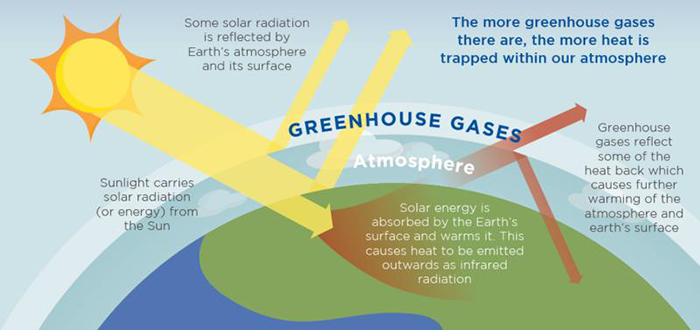
How can you reduce climate change and prepare for its impacts?
It isn’t a hopeless fight. You can play a part reducing greenhouse emissions and start preparing for the changes. Reducing your electricity usage, driving less and recycling more helps to reduce greenhouse gases.
Here are a few examples of what you can do:
- Carpool or cycle to work, or use public transport if you can.
- If you have a garden, plant indigenous, drought-resistant trees and shrubs around your home.
- Make sure your house is ready for storms in winter.
- Use energy efficient lightbulbs e.g. replace your lightbulbs with LED lightbulbs.
- Reduce your electricity consumption, unplug unused electronic devices, and turn off air conditioners.
- Turn down the temperature of your geyser or install a solar geyser.
- Invest in Renewable Energy (solar energy, wind energy, and Biomass).
- Reduce, re-use and recycle paper, plastic and other recyclable materials.
- Use water wisely.
These small changes don’t only reduce your contribution to climate change, they also save you money and improve your health.
What causes climate change?
Climate change occurs when greenhouse gases traps too much of the sun’s heat in our atmosphere and stops it from leaking back into space. This is commonly known as the greenhouse effect, as it acts like the glass in a greenhouse. Carbon Dioxide, which is produced when we burn oils and fossil fuels, is responsible for most of our greenhouse gases.
Other greenhouse gases include:
- Nitrous oxide – which can be found in fertilisers with nitrogen.
- Methane – this is produced by cows and sheep when they digest their food, as well as landfills when food and other organic waste breaks down. Increases in livestock farming and waste going to landfill have increased the amount of methane we put into the atmosphere.
- Fluorinated gases – which is a man-made gas used mainly in an industrial setting.
How have people contributed to climate change?
While some greenhouse gases occur naturally in nature, human activity is responsible for speeding up the production of these gases.
The burning of fossil fuels (e.g. through driving cars and to produce electricity), the cutting down of rainforests, the destruction of native vegetation, unsustainable development, the increase of livestock farming, industrial processes and an increased amount of waste going to landfills all contribute to speeding up climate change.
Droughts
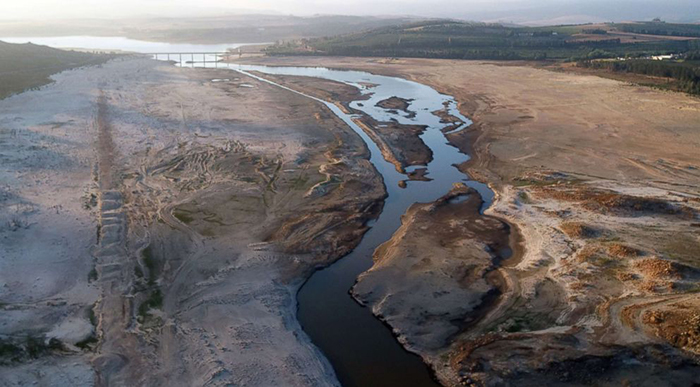
TWK Dam Western Cape 2018 – The water levels of Cape Town’s major supply dams, which are sourced by rainfall, have plunged because of the prolonged drought. The arid city experienced its driest year on record in 2017, following extremely low rainfall in 2015 and 2016.
Floods
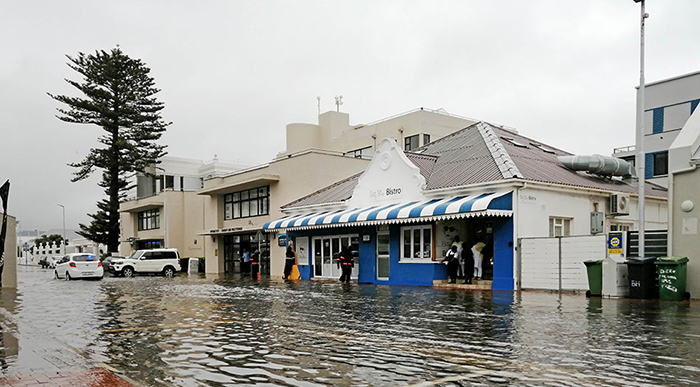
Fires
